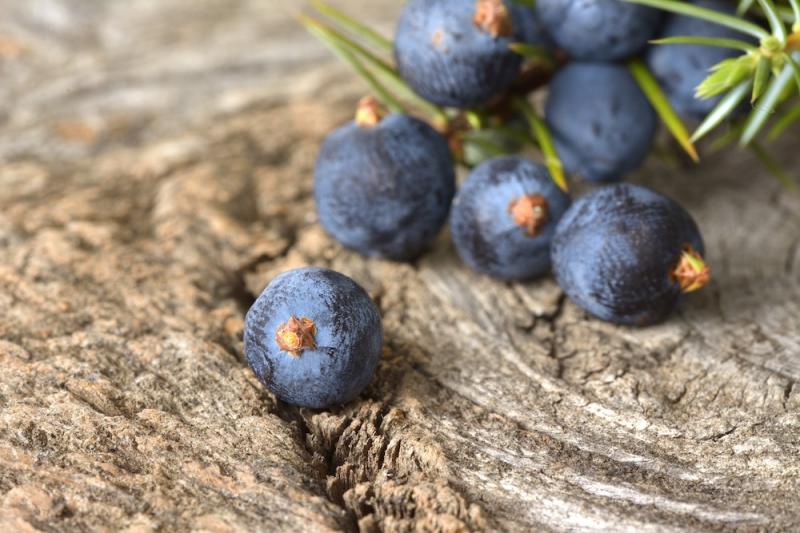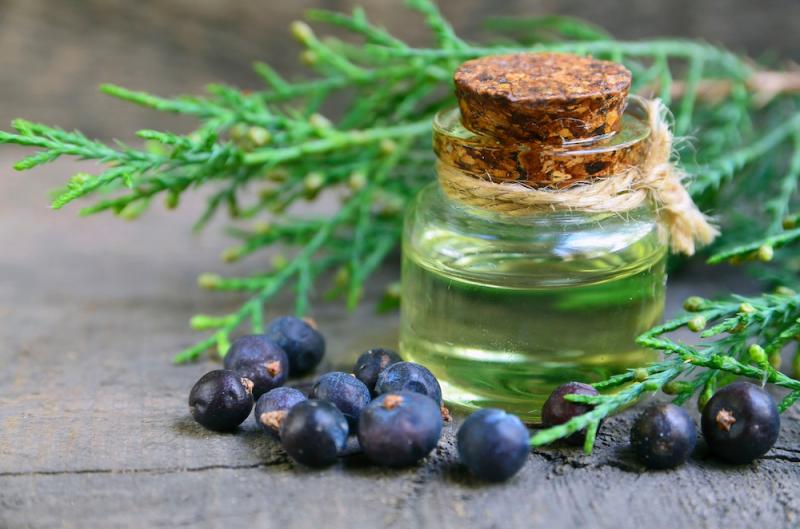.jpg)
I currently live in Cedar City, Utah, but it should really be called Juniper City, Utah. The same goes for Cedar Breaks National Monument just east of here. That’s because the early pioneers called the juniper trees growing in this area cedars. It just goes to show why you can’t trust common names for botanical purposes.
All the trees in the Juniperus genus, including the local species (Juniperus monosperma) misnamed as cedars, produce small flesh cones, mislabeled as berries. These berries are one of our best-known and widely used diuretic herbs. They stimulate urinary function to relieve edema. Their flavor is strongly aromatic and slightly astringent, giving them warming and drying properties. They’re a very fast-acting and effective diuretic as I observed firsthand when my wife was laboring to give birth to birth to our oldest daughter. She started to retain water and have difficulty peeing and the midwife made her some juniper berry tea, which promptly relieved the problem.
So, if you need a good diuretic, juniper berries are a good choice as long as there is no acute inflammation in the urinary system. Therefore, don’t use them if there is acute nephritis. In cases of cystitis or urethritis where there is water retention, you could use a small amount if you combine juniper with other, more soothing, diuretics like cornsilk, marshmallow, cleavers, and goldenrod. Juniper is somewhat disinfectant so it can also be used for urinary tract infections, but again works better in combination with other herbs like uva ursi, coptis, goldenseal, and pipsissewa.
Juniper Beyond the Urinary System
 Juniper berries have other properties that are not as widely recognized. Juniper berries stimulate digestion and can be used in digestive tonic formulas. They can be helpful for loss of appetite, gas and bloating, and dyspepsia. Some herbalists believe they are helpful for balancing blood sugar in diabetes, but I think this would only be if the diabetic person was also retaining fluid.
Juniper berries have other properties that are not as widely recognized. Juniper berries stimulate digestion and can be used in digestive tonic formulas. They can be helpful for loss of appetite, gas and bloating, and dyspepsia. Some herbalists believe they are helpful for balancing blood sugar in diabetes, but I think this would only be if the diabetic person was also retaining fluid.
Juniper berries have also been used as a food and flavoring agent. For starters, they’re used to flavor gin. They are also used to flavor meat as I learned when I tried making my own corned beef following a recipe from Alton Brown on his TV show Good Eats. The recipe called for juniper berries, so I walked down the road a couple of blocks and picked some from one of the junipers growing wild on the side of the road. No point in buying something if you can pick it, right?
Native Americans actually gathered them for food, eating them raw or cooked, but they have such a strong flavor that I think they’re best used for flavoring and medicine and not as a food source, unless you’re desperately hungry. But, there is one more interesting use for them in cooking. If you find berries that have a powdery white coating, that’s wild yeast, and you can pick some of them, put them in a mixture of flour and water and use them to start your own sourdough.
Juniper Essential Oil
 The essential oil is distilled from the green, unripe juniper berries. It has a woody, fresh, pine-like fragrance. It is antiseptic, analgesic, and helpful for cold, damp conditions. It can be diluted with a vegetable oil or massage oil and applied topically to reduce swelling, help to heal skin infections, and to ease arthritic pains. It helps to flush uric acid out of the system, too.
The essential oil is distilled from the green, unripe juniper berries. It has a woody, fresh, pine-like fragrance. It is antiseptic, analgesic, and helpful for cold, damp conditions. It can be diluted with a vegetable oil or massage oil and applied topically to reduce swelling, help to heal skin infections, and to ease arthritic pains. It helps to flush uric acid out of the system, too.
Theoretically, it can be used internally for poor digestion, edema, and urinary tract infections, but I’d be very careful with internal use. I’d only take one or two drops, no more than twice daily, and for no longer than two weeks. I’d also dilute those drops in a spoonful of coconut or olive oil to avoid irritating the intestinal tract. The essential oil may act as a uterine stimulant and has been used to stimulate menstruation. Therefore it should be avoided during pregnancy. And, like the berries themselves, the oil should be avoided with acute inflammation in the kidneys, bladder, or urinary passages.
Like most essential oils, juniper oil also has an effect on a person’s emotional state. It can be used for spiritual purification, helping to drive out negative thoughts and emotions. It helps people who are too absorbed in their own thoughts, worries, and bad memories to let go of these things and move on. Smelling or diffusing the oil is the best way to get these effects.
A Potent, Prolific Remedy
Father Kneipp, the Bavarian herbalist and nature-cure practitioner, had some interesting thoughts about juniper berries. He said, “When a new patient arrives I always start in by advising the taking of five juniper berries the first day. On the second day, I raise the amount to six. On the third to seven—and so on, adding one berry each day until the total of thirty is reached. Then I reverse the order and take away one berry each day until the original five had been reached. The effect of these juniper berries on the ailing is so marvelous—so miraculous—that the patient then gladly consents to go through with the entire treatment of my water cure without question.”
That's a pretty powerful claim for juniper berries. And, since they grow pretty much everywhere they're a remedy just about everyone can access without having to spend any money on them. If you’re collecting juniper berries wait until they ripen to a full dark blue or purplish color. The green berries contain more essential oil and the oil is converted to a resin as the berries darken.
Downloads
Steven's Articles
-

-
Barberry and Healthy Personal Boundaries
A thorny shrub for fighting infections and supporting…
December
-

-
The Evidence for Berberine
A yellow alkaloid found in traditional infection-fighting…
-

-
The Sensible Use of Caffeinated Herbs
Kola nuts, guarana, and yerba mate and other herbs…
-

-
The Health Benefits and Problems with Coffee
This popular caffeinated beverage can be beneficial…
October
-

-
Understanding Caffeine & Cellular Adaptation
Preserving the power of caffeine's buzz and the…
September
-

-
Horseradish
A pungent spice for aiding protein metabolism…
-

-
Banaba or Crepe Myrtle
A beautiful tree from Southeast Asia whose leaves…
August
-

-
Monkeyflowers
Flower essences to help see ourselves more clearly…
-

-
Mariposa Lilies
Strengthening the bond between mother and child…
-

-
The Noble Bay Leaf
A common kitchen herb for aiding digestion and…
-

-
Epimedium: Horny Goat Weed
A circulatory stimulant and kidney yang tonic…
July
-

-
The Medicinal and Nutritional Benefits of Apricots
A nutritious fruit and valuable medicinal seed for coughs
-

-
Dogwoods
Asian dogwood is used to stop excessive discharge,…
June
-

-
Neem: The Village Pharmacy
A popular Ayurvedic remedy for dental and immune…
-

-
Spilanthes: The Toothache Plant
A traditional remedy for teeth and gums, as well…

